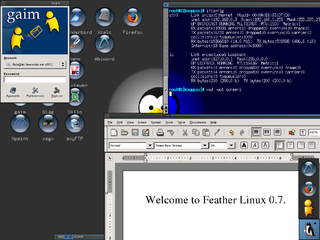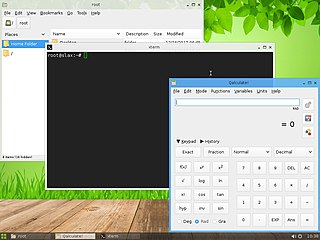 W
WA light-weight Linux distribution is one that uses lower memory and/or has less processor-speed requirements than a more "feature-rich" Linux distribution. The lower demands on hardware ideally result in a more responsive machine, and/or allow devices with fewer system resources to be used productively. The lower memory and/or processor-speed requirements are achieved by avoiding software bloat, i.e. by leaving out features that are perceived to have little or no practical use or advantage, or for which there is no or low demand.
 W
WCHAOS is a small Linux distribution designed for creating ad hoc computer clusters.
 W
WDamn Small Linux (DSL) is a computer operating system for the x86 family of personal computers. It is free and open-source software under the terms of the GNU GPL and other free and open source licenses. It was designed to run graphical user interface applications on older PC hardware, for example, machines with 486 and early Pentium microprocessors and very little random-access memory (RAM). DSL is a Live CD with a size of 50 megabytes (MB). What originally began as an experiment to see how much software could fit in 50 MB eventually became a full Linux distribution. It can be installed on storage media with small capacities, like bootable business cards, USB flash drives, various memory cards, and Zip drives.
 W
WFeather Linux, created by Robert Sullivan, was a Knoppix-based operating system which fits in under 128 MB. It boots from either a CD or a USB flash drive, into a Fluxbox desktop environment. It has a wide range of desktop and rescue software, and can load entirely into RAM or be installed to a hard drive. Feather Linux contains GTK+ applications, such as AbiWord and Pidgin. Feather Linux has tried to include software that people would frequently be using on their desktop.
 W
WFinnix is a Debian-based Live CD operating system, developed by Ryan Finnie and intended for system administrators for tasks such as filesystem recovery, network monitoring and OS installation. Finnix is a relatively small distribution, with an ISO download size of approximately 100 MiB, and is available for the x86 and PowerPC architectures, and paravirtualized systems. Finnix can be run off a bootable CD, a USB flash drive, a hard drive, or network boot (PXE).
 W
Wfli4l is a Linux distribution, actively developed by German developers since 2000. The projects main task is to provide a small Linux system that turns almost every machine into a router. The distribution can run from a floppy disk and was created with the aim of simple configuration and support for older hardware.
 W
WA light-weight Linux distribution is one that uses lower memory and/or has less processor-speed requirements than a more "feature-rich" Linux distribution. The lower demands on hardware ideally result in a more responsive machine, and/or allow devices with fewer system resources to be used productively. The lower memory and/or processor-speed requirements are achieved by avoiding software bloat, i.e. by leaving out features that are perceived to have little or no practical use or advantage, or for which there is no or low demand.
 W
WThe Linux Router Project (LRP) is a now defunct networking-centric micro Linux distribution. The released versions of LRP were small enough to fit on a single 1.44MB floppy disk, and made building and maintaining routers, access servers, thin servers, thin clients, network appliances, and typically embedded systems next to trivial.
 W
WThis is a list of Linux distributions that can be run entirely from a computer's RAM, meaning that once the OS has been loaded to the RAM, the media it was loaded from can be completely removed, and the distribution will run the PC through the RAM only. This ability allows them to be very fast, since reading and writing data from/to RAM is much faster than on a hard disk drive or solid state drive. Many of these operating systems will load from a removable media such as a Live CD or a Live USB stick. A "frugal" install can also often be completed, allowing loading from a hard disk drive instead.
NanoLinux is an open source, free and very lightweight Linux distribution that requires only 14 MB of disk space including tiny versions of the most common desktop applications and several games. It is based on the Core version of the Tiny Core Linux distribution and uses Busybox, Nano-X instead of X.Org, FLTK 1.3.x as the default GUI toolkit, and SLWM. The included applications are mainly based on FLTK.
 W
WPorteus is a portable operating system based on Slackware. It does not require installation and can be run from fixed and removable media, such as a USB flash drive or compact disc.
 W
WPuppy Linux is an operating system and family of light-weight Linux distributions that focus on ease of use and minimal memory footprint. The entire system can be run from random-access memory with current versions generally taking up about 600 MB (64-bit), 300 MB (32-bit), allowing the boot medium to be removed after the operating system has started. Applications such as AbiWord, Gnumeric and MPlayer are included, along with a choice of lightweight web browsers and a utility for downloading other packages. The distribution was originally developed by Barry Kauler and other members of the community, until Kauler retired in 2013. The tool Woof can build a Puppy Linux distribution from the binary packages of other Linux distributions.
 W
WSlax is a LiveCD Linux distribution developed by Tomáš Matějíček and based on Debian. Packages can be added by apt package manager or can be prepared as modules. The tagline for Slax refers to itself as "your pocket operating system".
 W
WSliTaz GNU/Linux is a lightweight Linux distribution, community-based, suitable for use on older hardware and as a Live CD or Live USB. SliTaz stands for "Simple, Light, Incredible, Temporary Autonomous Zone" according to the boot screen.
 W
WTiny Core Linux (TCL) is a minimal Linux kernel based operating system focusing on providing a base system using BusyBox and FLTK. It was developed by Robert Shingledecker, who was previously the lead developer of Damn Small Linux. The distribution is notable for its small size and minimalism; additional functions are provided by extensions. Tiny Core Linux is free and open-source software licensed under the GNU General Public License version 2.
 W
Wtomsrtbt is a very small Linux distribution. It is short for "Tom's floppy which has a root filesystem and is also bootable." Its author, Tom Oehser, touts it as "The most GNU/Linux on one floppy disk", containing many common Linux command-line tools useful for system recovery It also features drivers for many types of hardware, and network connectivity.